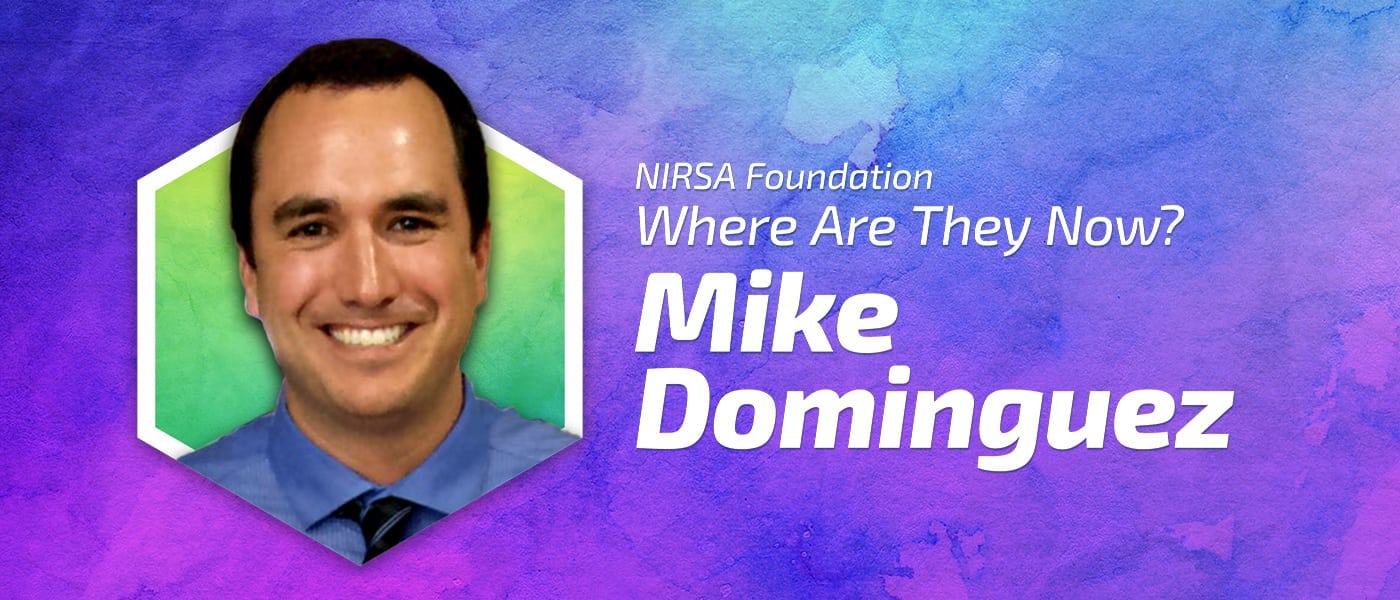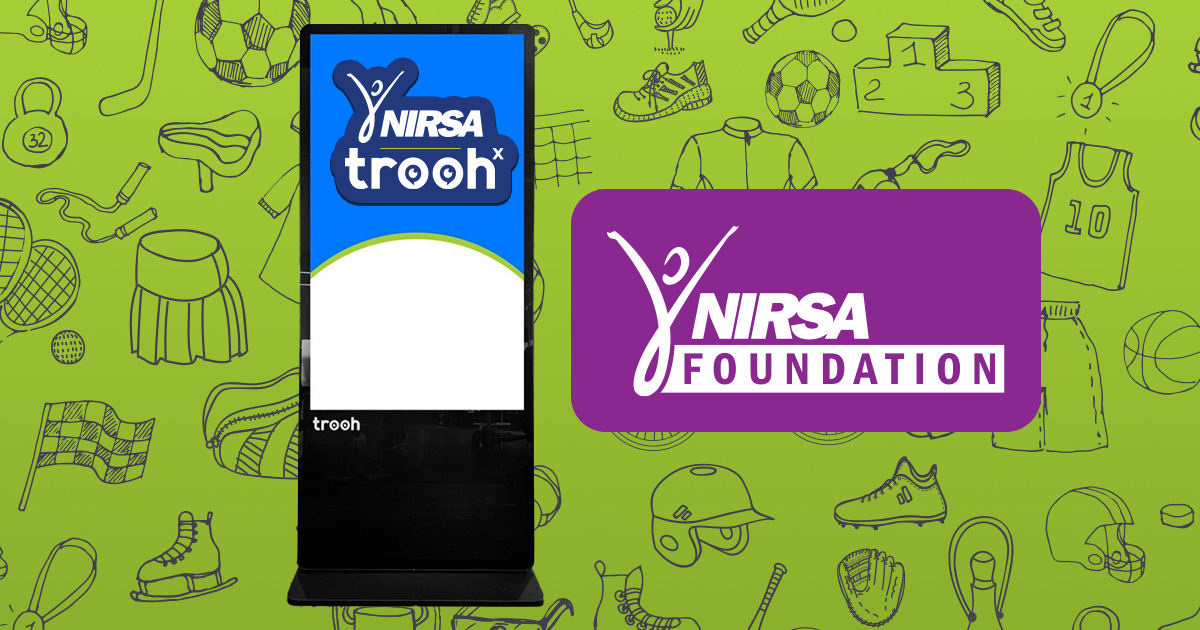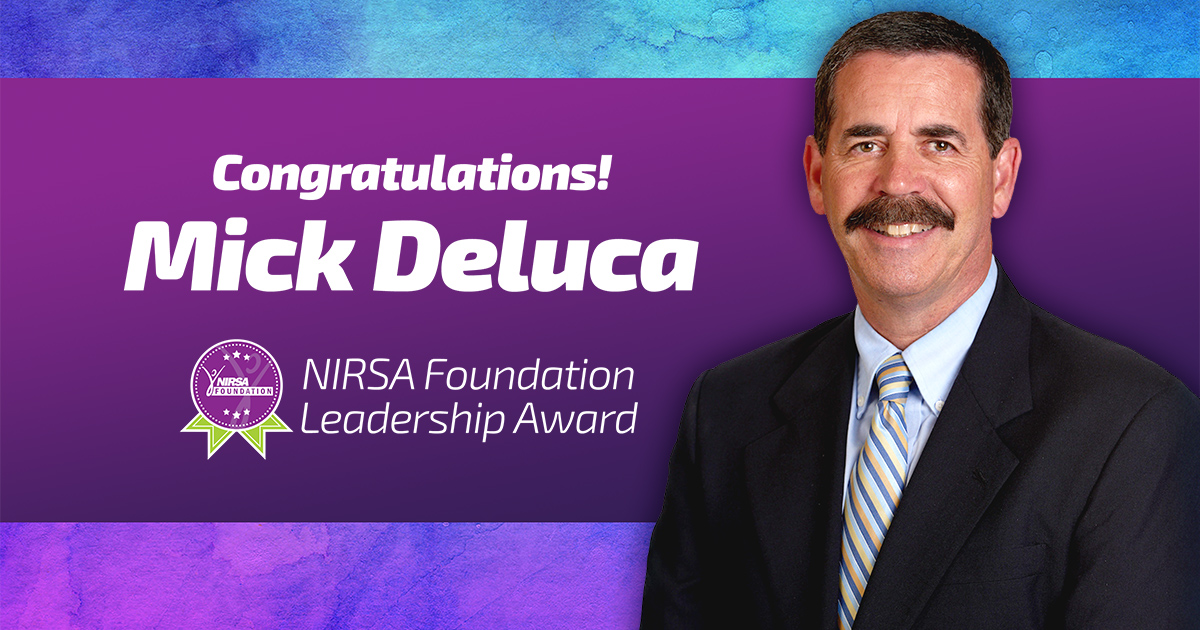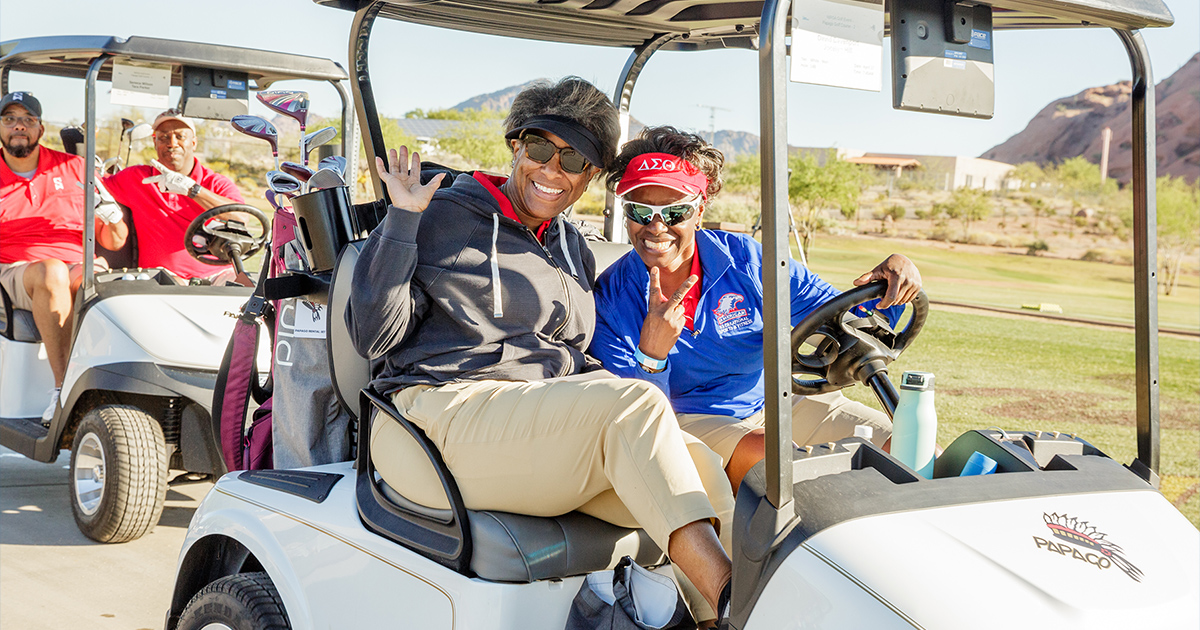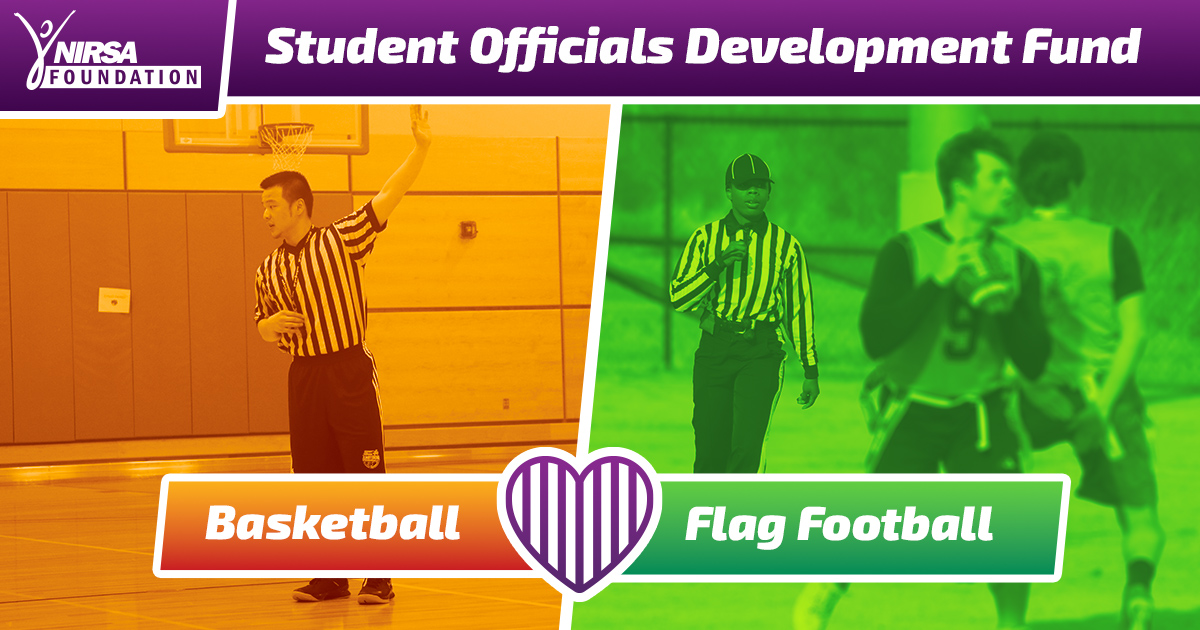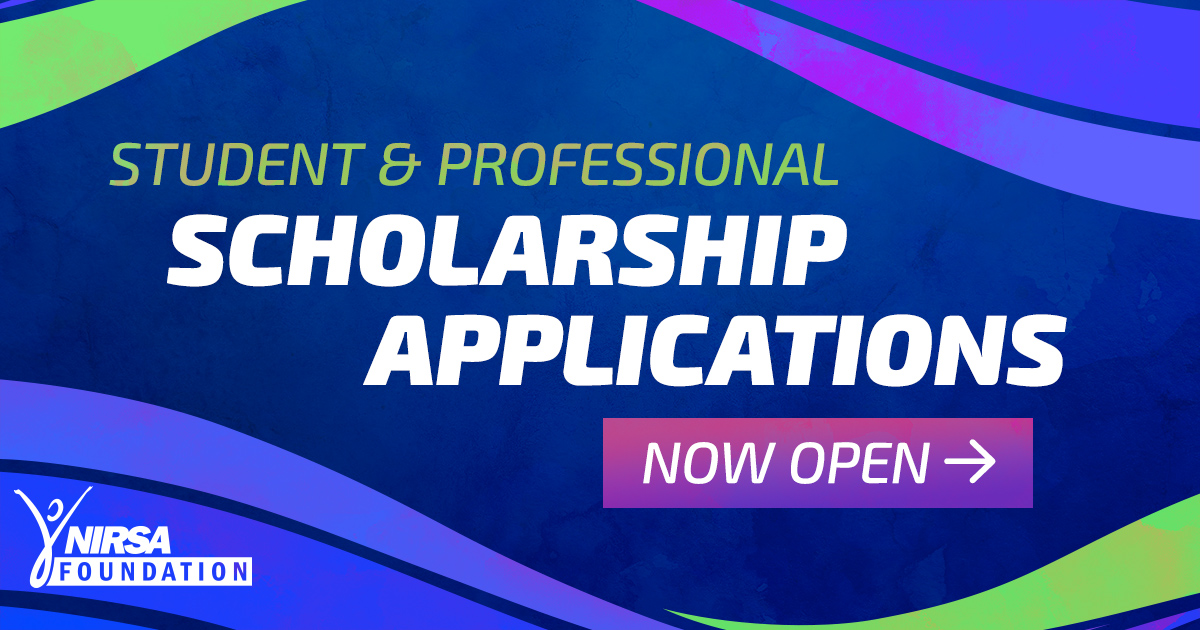When Mike Dominguez began officiating in grade school, he had no idea that many years later it would be his introduction to the world of collegiate recreation. He had already been a high school-level referee for soccer, basketball, and baseball before landing a job working as an intramural official for indoor soccer at Sonoma State University as an undergraduate.
It’s that job that he credits with leading to a position as a student coordinator in the rec department and his current career as a campus recreation professional. He says, “As a student, I was heavily involved in playing sports and watching sports.” So, it’s probably no surprise that these opportunities were perfect for him as an undergrad. At the same time, he explains, “I had no idea I could parlay my passion into a full-time job.”
A NIRSA mentor reveals opportunities
After graduation, however, Mike admits feeling a little lost when it came to knowing what he wanted to do. Taking a full-time job at a department store as an assets protection manager—he was charged with arresting shoplifters and catching fellow employees stealing—was a step towards helping him figure it out though.
Mike is frank when he says, “It was the worst job of my life.” A year later, he made some big changes after speaking to his mentor, Pam Su—now of San Francisco State University but formerly of Sonoma State. He asked her about his options in the field of recreation. “I didn’t realize I could have grad school paid for and work in a field I thoroughly enjoyed,” Mike explains. From that conversation he decided to apply to grad school and for graduate assistantships. He adds, “Something that also helped shape my decision was my parents. My dad was a teacher, principal, and superintendent. My mom was a kindergarten teacher. Teaching was in my blood. Campus recreation has the perfect blend of competitive sports and student development which were both my strengths and passions.”
Mike applied to a few grad schools and interviewed for graduate assistant positions at the 2004 NIRSA Annual Conference in Albuquerque, New Mexico. He ended up accepting a position as the Intramural GA at Northern Arizona University where he received his master’s in educational leadership.
It was during grad school “where I truly found my desire to make this my career,” says Mike. “Working with students, developing and running programs, networking with campus recreation students and professionals, going to conferences, workshops, and regional tournaments filled my bucket.” After graduation, he worked at the University of Southern California as the Intramural, Sport Club, Kids Camp, and Spirit Squad Coordinator a year and a half before returning to Sonoma State University as their Intramurals, Sport Clubs, and Kids Camp Coordinator.
Over time, he extended his responsibilities to include oversight of operations, memberships, marketing, and informal recreation in addition to his previous duties. Seven and a half years later, after his first son was born, he chose to move closer to his family when a job at the University of California, Davis opened up. He’s been there for the past three years and his current title is the Sport Club Coordinator.
NIRSA Foundation opens pathways into the profession for students and emerging professionals
Over the course of his time in the campus recreation field, Mike has received two scholarships from the NIRSA Foundation. He received his first scholarship as a graduate student in 2006 while at Northern Arizona University and his second in 2015 as a professional at Sonoma State University.
“Having been on a few scholarship committees now, it’s nice to see the other side of the process,” says Mike. “Winning a scholarship means you’ve put a lot of work into your position and your career. It means you’ve spent time outside your normal day-to-day and have given back to the Association by volunteering for various committees or work teams.” Mike was once a student who didn’t know what his career track was going to be; so, he believes these NIRSA Foundation scholarships are a real opportunity for students. “If students choose another path, that’s perfectly fine. But if they don’t know a path exists, that’s where our guidance as an Association is needed.”
Mike used both of his scholarships to attend NIRSA Annual Conferences. “NIRSA 2015 in Grapevine, Texas is where I was awarded the inaugural Sonoma State Alumni of the Year Award, which holds a special place in my heart, and the Fist of Fury hangs proudly on my office wall,” says Mike. But what he remembers most fondly about both conferences is the people. “That is what makes NIRSA such an amazing place and what makes campus recreation an incredible place to work,” he explains.
“The friendships I’ve been able to develop over the years make me smile with delight.” This is why Mike says he has served on so many NIRSA committees and work teams over the years and why he volunteers for NIRSA Championship Series tournaments—he enjoys it.
Push your boundaries, go outside your comfort zone, and give back
He’s currently serving on the Student Professional Development Committee, the Concussion Advisory Task Force, and the Flag Football Work Team. “My favorite part about serving on NIRSA committees and volunteering at tournaments is the networking,” says Mike. “Building friendships over my career in NIRSA has been valuable to my personal and professional life. Being involved in committees allows me to expand my network, challenge myself, and learn new things. Since my job currently revolves around sport and sport clubs, I try to serve on a committee involving my job and another to push my comfort zone. It’s also important to give back,” he stresses. “I was fortunate to have great mentors and supervisors along my path, so it’s important to do the same as we become the mentors.”
When discussing mentors, Mike has to mention Pam Su. Not just because she showed him that collegiate recreation was a career path but because she was the reason he was ever a student coordinator as an undergrad at Sonoma State. “Pam was the only full-time staff and the program was run by ten student coordinators. I didn’t apply for the job because I didn’t think I was qualified. Luckily, they didn’t hire anybody from their first round of interviews and the position re-opened. Pam reached out to me to see if I would consider applying. If she didn’t reach out to me, I might not be here today,” says Mike. “I think about that when our capable students need a push in the right direction to go outside their comfort zones.”
The student coordinators were in many ways asked to perform at a level of graduate assistants and full-time staff, a philosophy Mike uses to challenge and teach his own staff today. He continues asks Pam for advice and feedback all these years later, strives to be the best possible mentor he can be to his own student staff, and his involvement with the Association is strongly rooted in the example Pam has set. “I’ve been involved in one to three committees each year for the past 10+ years because she’s taught me how valuable it is to push your boundaries, go outside your comfort zone, and give back,” says Mike.
Investing in mentorship
Mentorship now plays a significant role in Mike’s life. He even goes so far as to say it’s a major part of why he does his job. Mentoring is “one of the reasons I love working with sport clubs. As an administrator I get to work with our office staff, student supervisors, student managers, and sport club officers. Mentoring, challenging, and supporting them each differently,” says Mike. “Building these relationships and maintaining them throughout the years is extremely special. There are a number of former student employees who are currently working in the field of recreation. I am so proud of what they’ve accomplished, what they are going to accomplish. But, more importantly, they are amazing people. I feel honored when students from years back ask for letters of recommendations or if I’d be a reference for a current job they are applying for.”
Like many in the profession, Mike was once unaware of all that campus recreation had to offer. Today, he is a tireless advocate for the good that rec can do for students. “Campus recreation gives students a home away from home. We have such a diverse set of programs that every student can find something they are passionate about,” he explains. “Campus recreation also provides a community to students and helps with recruitment and retention. It’s more than just playing sports, taking a fitness class, or climbing a rock wall. Students and staff develop friendships and skills that will help them be successful in life after college. We are developing the future leaders of the world by creating an inclusive and engaging environment that promotes passion, excellence, and a healthy quality of life.”
As a recipient of NIRSA Foundation Scholarships, as a passionate mentor and committed Association volunteer, Mike knows the value in supporting NIRSA and advocating for campus recreation.
- If you’re interested in sharing your story, please contact NIRSA Foundation Coordinator Chris Muller, or NIRSA Foundation Coordinator Kameron Carroll.
Nazifa Islam was previously the Communications Coordinator at NIRSA.


